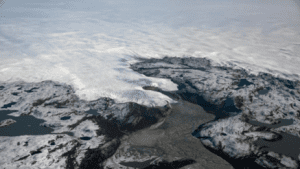TAG: GS 3: ECOLOGY AND ENVIRONMENT
THE CONTEXT: As per a recent study utilizing nearly 240,000 satellite images spanning the years 1985 to 2022 has unveiled that Greenland’s ice sheet has experienced a 20% greater loss than previously estimated.
EXPLANATION:
- The research, conducted by scientists in the United States, sheds light on the escalating impact of climate change on one of the world’s largest ice masses.
- Previous assessments indicated that approximately 5,000 gigatons of ice had vanished from Greenland’s surface in the past two decades.
- However, the recent study identified an additional 1,000 gigatons, constituting a significant underestimation in prior calculations.
- This revised data emphasizes the urgency of understanding and addressing the accelerating ice loss.

Glacial Retreat and Thinning:
- A glaciologist from NASA’s Jet Propulsion Laboratory, emphasized the pervasive nature of the ice loss, stating that nearly every glacier in Greenland has either thinned or retreated over the past few decades.
- The study’s focus on glacier terminus positions, where glaciers meet the ocean, underscores the widespread and simultaneous nature of these alarming changes.
Global Implications:
- While the ice loss along Greenland’s edges may have a “minimal” direct impact on sea level rise, the findings raise concerns about the potential for further overall ice melt.
- The study suggests that the melted ice at the island’s edges could facilitate easier glacier movement towards the sea.
- It can potentially contribute to rising sea levels in the future.
Sensitivity to Global Warming:
- The research reveals that glaciers in Greenland most susceptible to seasonal variations, such as expansion in winter and retreat in summer, are also the ones most sensitive to the broader impacts of global warming.
- This sensitivity has resulted in significant retreats since 1985, signaling the vulnerability of these glaciers to the accelerating effects of climate change.
Contributions to Sea Level Rise:
- Greenland’s vast ice sheet, the second-largest in the world after Antarctica, has been a significant contributor to observed sea level rise since 2002, accounting for more than 20%.
- The study underscores the importance of accurately quantifying ice loss to refine projections of future sea level rise and informs ongoing discussions surrounding climate change mitigation.
Conclusion:
- The findings of this comprehensive satellite study underscore the urgency of addressing the escalating impact of climate change on Greenland’s ice sheet.
- With glaciers across the region exhibiting signs of thinning and retreat, the potential consequences for global sea levels highlight the critical need for proactive measures to mitigate climate change and its far-reaching implications.

